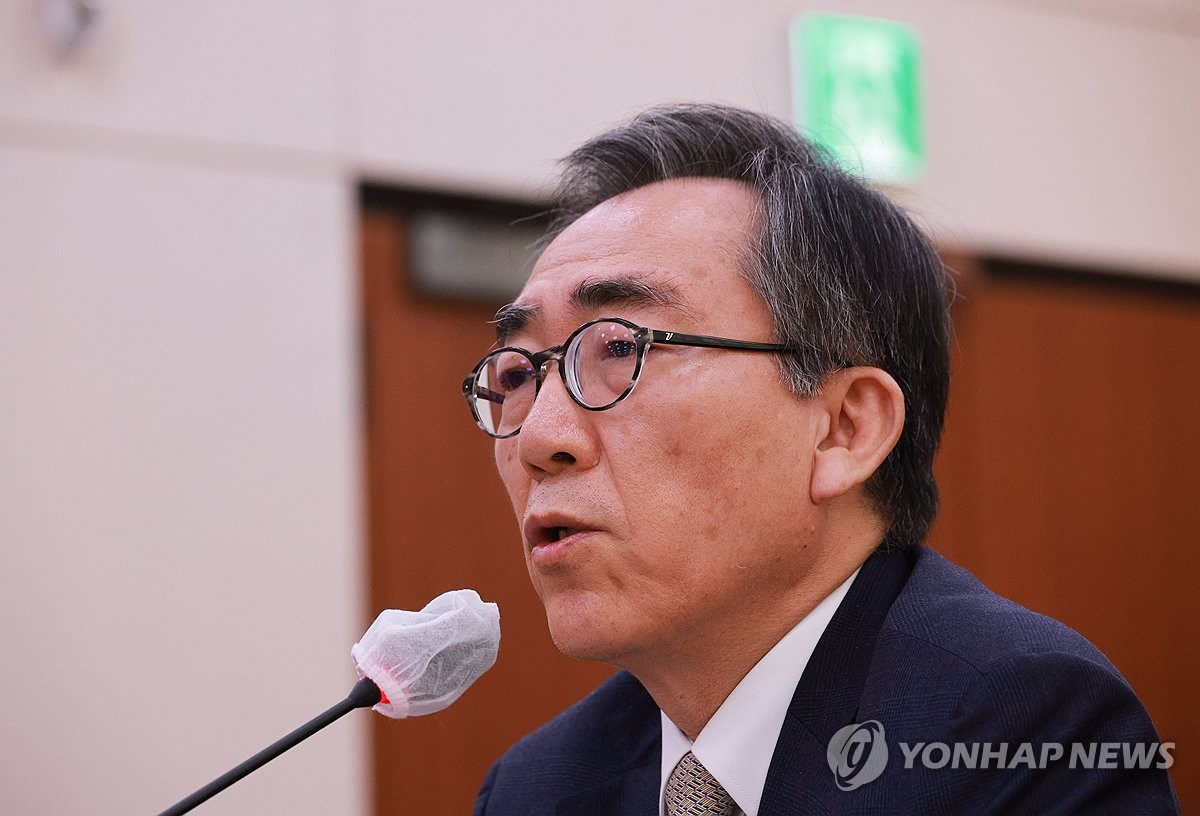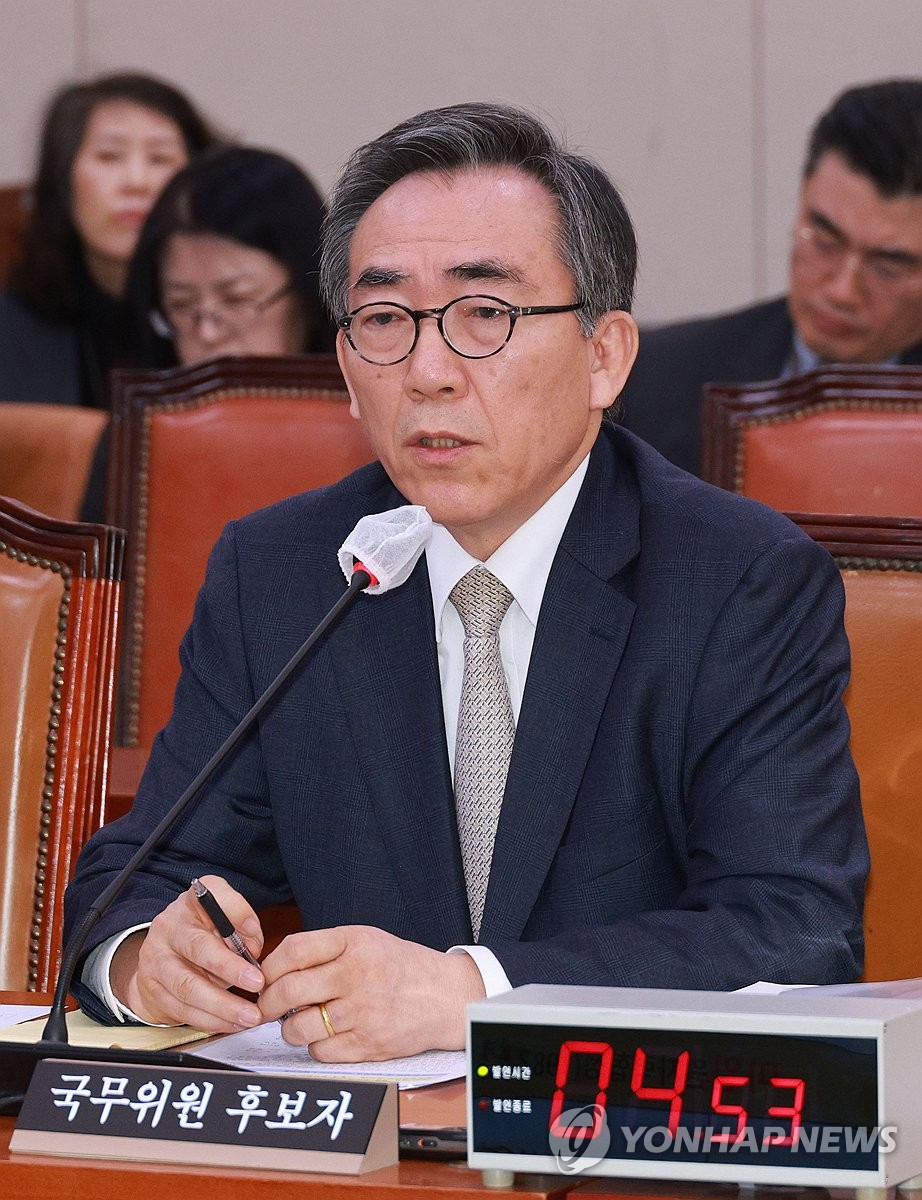- California Assembly OKs highest minimum wage in nation
- S. Korea unveils first graphic cigarette warnings
- US joins with South Korea, Japan in bid to deter North Korea
- LPGA golfer Chun In-gee finally back in action
- S. Korea won’t be top seed in final World Cup qualification round
- US men’s soccer misses 2nd straight Olympics
- US back on track in qualifying with 4-0 win over Guatemala
- High-intensity workout injuries spawn cottage industry
- CDC expands range of Zika mosquitoes into parts of Northeast
- Who knew? ‘The Walking Dead’ is helping families connect
FM nominee stresses need to work with China while maintaining alliance with U.S.
South Korea should work on its relations with China based on the principle that it does not undermine the alliance with the United States, the nominee for foreign minister said Monday, highlighting that there cannot be an “absolute” balance in maintaining ties with the two countries.
Cho Tae-yul made the remarks at a parliamentary hearing on his nomination, calling China a “partner” that has a lot to cooperate on with South Korea despite differences in many areas.
“An alliance is an alliance and a partner is a partner. I don’t think we can establish a complete and absolute balance between the two relationships,” Cho said during the confirmation hearing at the National Assembly.
“There are elements of conflict (with China), but I think there are more elements of cooperation,” he said, adding that he will try to produce substantive results in areas such as the economy and human exchanges.
Cho, a retired diplomat and former ambassador to the United Nations, was tapped as the new foreign minister last month.
Cho said he will ramp up efforts to boost the South Korea-U.S. alliance and focus on building relations with China for future cooperation.

In opening remarks, Cho vowed to focus on focus on accelerating cooperation with the United States and Japan amid growing missile and nuclear threats from North Korea.
“We will push for South Korea-U.S.-Japan cooperation, which was institutionalized at the Camp David trilateral summit, with greater depth and speed,” Cho said.
North Korea has recently upped the ante on the Korean Peninsula, firing several dozens of artillery shells near the inter-Korean border for three consecutive days.
He stressed the ministry will seek to dissuade North Korea from developing nuclear weapons and work in cooperation with the international community to help Pyongyang realize that achieving denuclearization through dialogue is the “only way to survive.”
“Denuclearization and strengthening nuclear deterrence have become urgent security tasks as North Korea’s nuclear and missile capabilities have reached a level that threatens our lives,” he said.
During the hearing, Cho reaffirmed his position on pushing for the government’s plan to compensate Korean victims of forced labor during Japan’s 1910-45 colonial rule through a foundation funded by South Korean companies.
In March last year, Seoul announced its plan to compensate 15 victims through the “third-party reimbursement system” without compensation from liable Japanese firms, which was initially met with a strong backlash from victims who demanded Japan’s apology and direct participation in the compensation process.
“I will put in every effort as there is no breakthrough other than the third-party compensation plan,” he said.
Cho also countered claims by Rep. Kim Kyung-hyup of the Democratic Party that the growing cooperation between Seoul, Washington and Tokyo led to closer ties between Pyongyang, Beijing and Moscow.
“We are strengthening South Korea-U.S.-Japan cooperation in response to the already strengthening cooperation between North Korea, China and Russia,” he said.
When asked whether Seoul plans to directly raise the issue of China’s forced repatriation of North Korean defectors with Beijing, Cho said he understands that it is being considered.
China does not recognize North Korean defectors as refugees and repatriates them to their home country, where they are likely to face harsh punishment. Seoul has repeatedly voiced opposition against the forced repatriation.

Cho was also questioned about his suspected involvement in a high-profile judicial power abuse scandal centering on former Supreme Court Chief Justice Yang Sung-tae under the previous administration of President Park Geun-hye.
The former chief justice is accused of having orchestrated a delay in the deliberation of a damages suit filed by the forced labor victims to curry favor with Park, who was seeking amicable relations with Tokyo.
Cho, the then second vice foreign minister, held multiple consultations with a senior top court official, also implicated in the scandal.
Cho has claimed that the consultations took place as a routine procedure that includes the foreign ministry’s submission of a written opinion on the matter. Cho was never charged in the case.
“It was a case that occurred over the process in which the foreign ministry and the judiciary shared their concerns and contemplated the appropriate way to respond for the sake of our national interest,” Cho said.
“I cannot agree with defining this issue as judicial manipulation,” he said.












